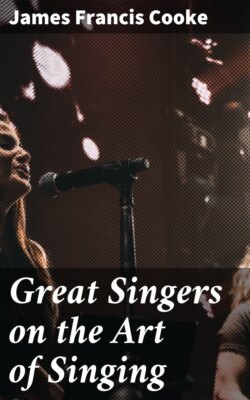Читать книгу Great Singers on the Art of Singing - James Francis Cooke - Страница 7
На сайте Литреса книга снята с продажи.
The Lure of Individuality
ОглавлениеCertain performers in vaudeville owe their continued popularity to the fascinating individuality of their voices. Albert Chevalier, once heard, could never be forgotten. His pathetic lilt to "My Old Dutuch" has made thousands weep. When he sings such a number he has a far higher artistic control over his audience than many an elaborately trained singer trilling away at some very complicated aria.
A second-rate opera singer once bemoaned his fate to the writer. He complained that he was obliged to sing for $100.00 a week, notwithstanding his years of study and preparation, while Harry Lauder, the Scotch comedian, could get $1000 a night on his tours. As a matter of fact Mr. Lauder, entirely apart from his ability as an actor, had a far better voice and had that appealing quality that simply commandeers his auditors the moment he opens his mouth.
Any method or scheme of teaching the art of singing that does not seek to develop the inherent intellectual and emotional vocal complexion of the singer can never approach a good method. Vocal perfection that does not admit of the manifestation of the real individual has been the death knell of many an aspiring student. Nordica, Jean de Reszke, Victor Maurel, Plançon, Sims Reeves, Schumann-Heink, Garden, Dr. Wüllner, Evan Williams, Galli-Curci, and especially our greatest of American singers, David Bispham, all have manifested a vocal individuality as unforgetable to the ear as their countenances are to the eye.
If the reader happens to be a young singer and can grasp the significance of the previous paragraph, he may have something more valuable to him than many lessons. The world is not seeking merely the perfect voice but a great musical individuality manifested through a voice developed to express that individuality in the most natural and at the same time the most comprehensive manner possible. Therefore, young man and young woman, does it not seem of the greatest importance to you to develop, first of all, the mind and the soul, so that when the great hour comes, your audience will hear through the notes that pour from your throat something of your intellectual and emotional character? They will not know how, nor will they ask why they hear it—but its manifestation will either be there or it will not be there. Upon this will depend much of your future success. It can not be concealed from the discerning critics in whose hands your progress rests. The high intellectual training received in college by Ffrangçon Davies, David Bispham, Plunkett Greene, Herbert Witherspoon, Reinald Werrenrath and others, is just as apparent to the intelligent listener, in their singing at recitals, as it would be in their conversation. Others have received an equivalent intellectual training in other ways. The young singer, who thinks that in the future he can "get by" without such a training, is booked for disappointment. Get a college education if you can; and, if you can not, fight to get its equivalent. No useful experience in the singer's career is a wasted one. The early instrumental training of Melba, Sembrich, Campanari, Hempel, Dalmores, Garden, and Galli-Curci, shows out in their finished singing, in wonderful manner. Every singer should be able to play the piano well. It has a splendid effect in the musical discipline of the mind. In European conservatories, in many instances, the study of the piano is compulsory.
